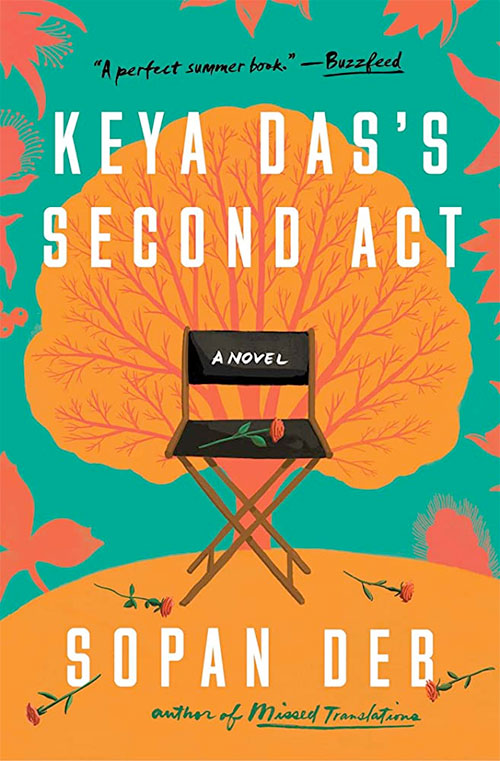Keya Das’s Second Act by Sopan Deb is a poignant novel about grief and forgiveness that follows a Bengali American family reeling from the sudden loss of their daughter and sister, titular character Keya Das. Each member of the family regrets not being more supportive when Keya came out, and now it’s too late to do anything about it…or is it? The novel picks up when Shantanu, Keya’s father, discovers a box containing a play Keya was writing with her girlfriend. It briefly brings Keya back to life for them, so her family embarks on a mission to stage the play to honor her memory and make amends.

Rejection is often a much more powerful emotion than acceptance.
Sopan Deb, Keya Das’s Second Act
With loss of a child and implied homophobia at the forefront of this novel, this is an emotional read. Grief impacts different people in different ways, and that makes Deb’s cast of characters even more important as they are vehicles through which readers can experience the central themes in this story. Following Keya’s death, Shantanu isolates himself from his family, his wife Chaitali tries to move forward with her own life, and their eldest daughter Mitali tries to distance herself from her sorrow — all very relatable coping mechanisms. But because their journeys are so disparate, it’s a little challenging to keep up with the various side characters that help to bring the family back together. None of them are developed enough, which sometimes makes their heavy influence on our key characters a little difficult to understand. The ultimate message is to encourage leaning on community to help assuage and process the big feelings that occur during times of grief, but the poignancy of that takeaway sometimes gets lost in Deb’s delivery.
I particularly enjoyed the Bengali words interspersed throughout otherwise English language sentences. As a Bengali American who grew up in a bilingual household within a diaspora community, that is exactly how we speak! I’ve seen criticism about the lack of a glossary or sufficient context clues to decode the meaning of select Bengali phrases in other reviews for this novel; however, I like to view this creative choice as a postcolonial resistance to the residual effects of Orientalist policies that defined English as the medium of instruction and the language of knowledge itself. Deb’s language choice — his refusal to translate, sanitize, or suppress the story he wanted to elevate — empowers him to seize back control of how he defines himself in a postcolonial reality still very much influenced by the lingering aftereffects of imperialism.
But more than anything, they each blamed themselves. In their own ways, they had made Keya feel unseen.
Sopan Deb, Keya Das’s Second Act
The one thing I really struggled with in this novel was lack of LGBTQ+ representation. Yes, Keya is gay, but her identity felt like a plot device for characters who didn’t want to accept her sexuality when she was still alive. They took her manuscript, interpreted it for the stage as they saw fit, and essentially used it for their own devices. For lack of a better term, the allyship after the fact felt performative. I realize with a tragedy like this, catharsis just might be the best we can hope to achieve since it’s too late to apologize to Keya or treat her the way she deserved. Still, I expected to see more positive and normalized representation. Keya’s lack of voice in this aspect of the novel has me going back and forth with classifying this novel within the LGBTQ+ category.
For all the heavy themes that form the foundation of this novel, it is surprisingly heartwarming and hopeful. Keya Das’s Second Act begins with characters weighed down by grief, regret, and trauma, and Deb navigates them through a healing journey that leaves them in a better place. This novel reminds readers it isn’t too late for us to take the time to listen and carefully consider how our actions affect the people in our lives. And even if it is too late — like it was for Keya — her family demonstrates it’s never too late to learn and grow from mistakes.
Thank you to NetGalley and Simon & Schuster for sharing an advanced reader copy of this book in exchange for an honest review.
Keya Das’s Second Act at a glance
Book details
Title: Keya Das’s Second Act
Author: Sopan Deb
Publisher: Simon & Schuster
Release Date: July 5, 2022
Page Count: 288
Synopsis
A poignant, heartwarming, and charmingly funny debut novel about how a discovered box in the attic leads one Bengali American family down a path toward understanding the importance of family, even when splintered.
Shantanu Das is living in the shadows of his past. In his fifties, he finds himself isolated from his traditional Bengali community after a devastating divorce from his wife, Chaitali; he hasn’t spoken to his eldest daughter Mitali in months; and most painfully, he lives each day with the regret that he didn’t accept his teenaged daughter Keya after she came out as gay. As the anniversary of Keya’s death approaches, Shantanu wakes up one morning utterly alone in his suburban New Jersey home and realizes it’s finally time to move on.
This is when Shantanu discovers a tucked-away box in the attic that could change everything. He calls Mitali and pleads with her to come home. She does so out of pity, not realizing that her life is about to shift.
Inside the box is an unfinished manuscript that Keya and her girlfriend were writing. It’s a surprising discovery that brings Keya to life briefly. But Neesh Desai, a new love interest for Mitali with regrets of his own, comes up with a wild idea, one that would give Keya more permanence: what if they are to stage the play? It could be an homage to Keya’s memory, and a way to make amends. But first, the Dases need to convince Pamela Moore, Keya’s girlfriend, to give her blessing. And they have to overcome ghosts from the past they haven’t met yet.
A story of redemption and righting the wrongs of the past, Keya Das’s Second Act is a warmly drawn homage to family, creativity, and second chances. Set in the vibrant world of Bengalis in the New Jersey suburbs, this debut novel is both poignant and, at times, a surprising hilarious testament to the unexpected ways we build family and find love, old and new.



